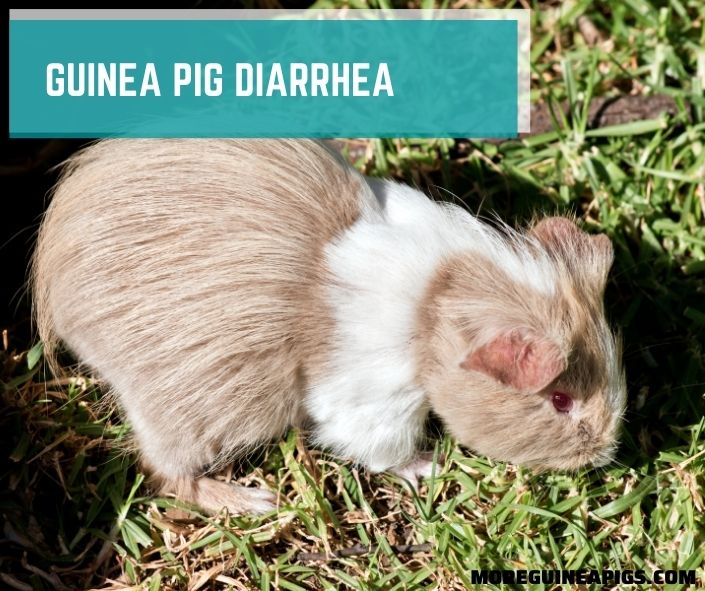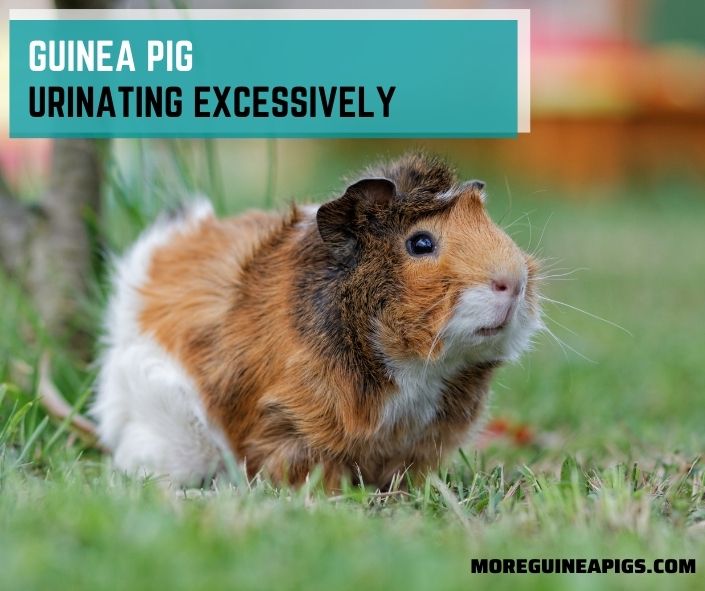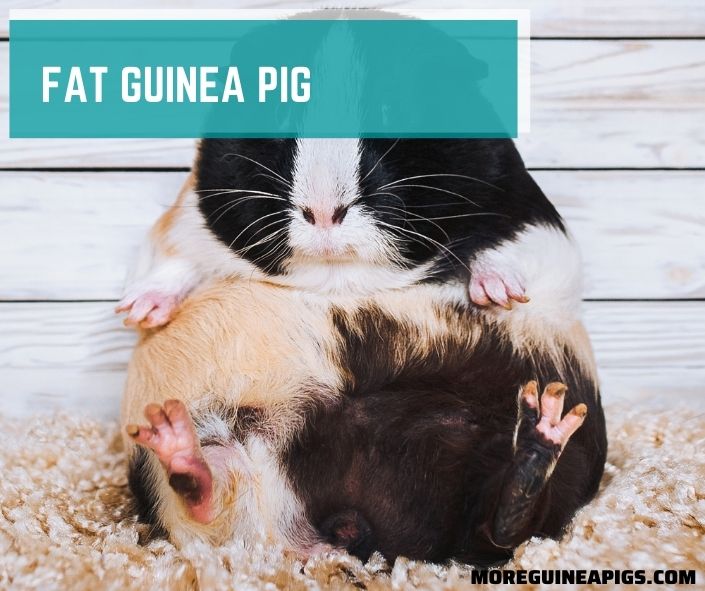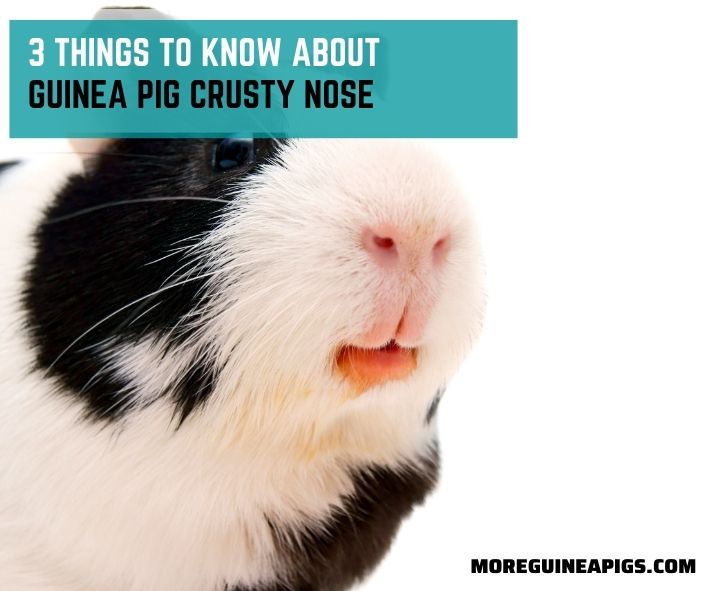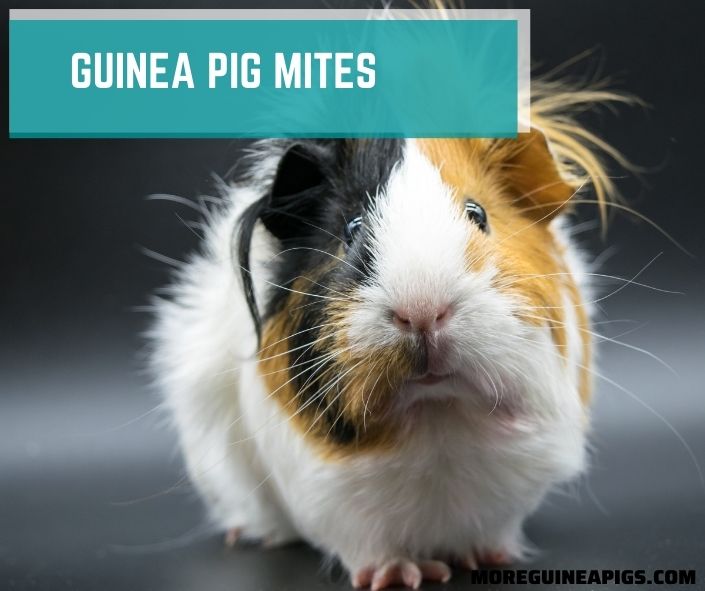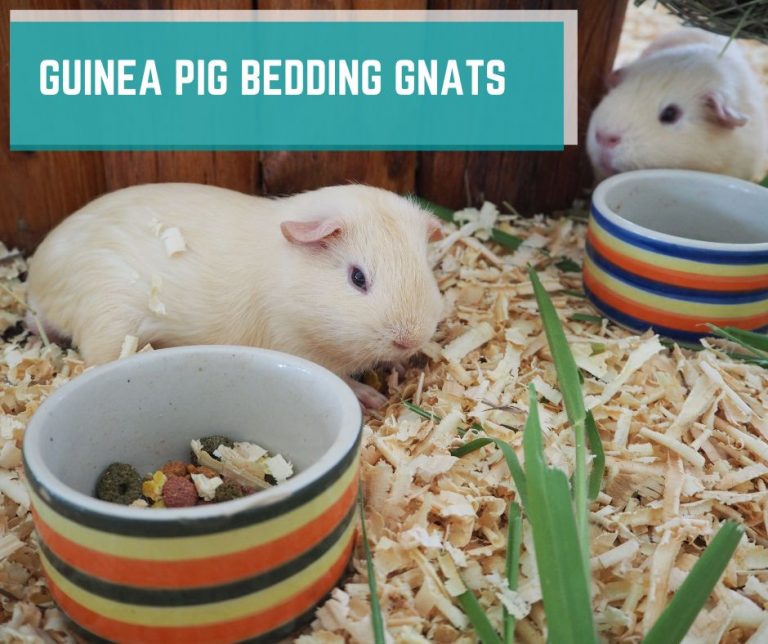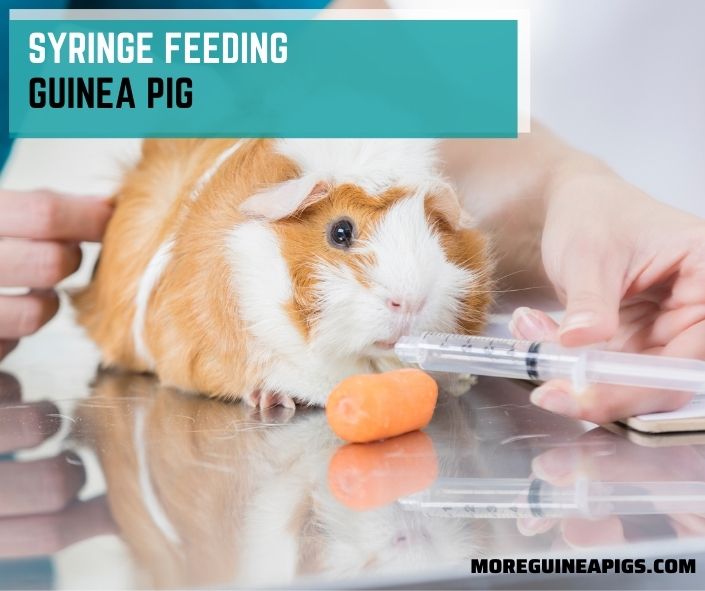Guinea Pig Diarrhea: Signs, Cause, Treatment and Prevent
Guinea pig diarrhea is caused by different factors. As a pet owner, you should be watchful for any signs and treat your cavies on time.
Diarrhea is a common cause of death in guinea pigs if not treated. If you love your pets, you will be keen on deploying preventive measures.
Diarrhea in guinea pigs can be treated or prevented. Continue reading as we dip deeper into the causes, diagnosis, treatment, and prevention of guinea pig diarrhea.
Is Diarrhea Common In Guinea Pigs?
Yes, diarrhea is one of the most common health problems that cavies experience. Many bacteria, viruses, and parasites can upset the cavy’s digestive system.
Usually, guinea pigs pass out oval poops with semi-hard and uniform consistency. For diarrhea, the poops become loose, unformed, or watery.
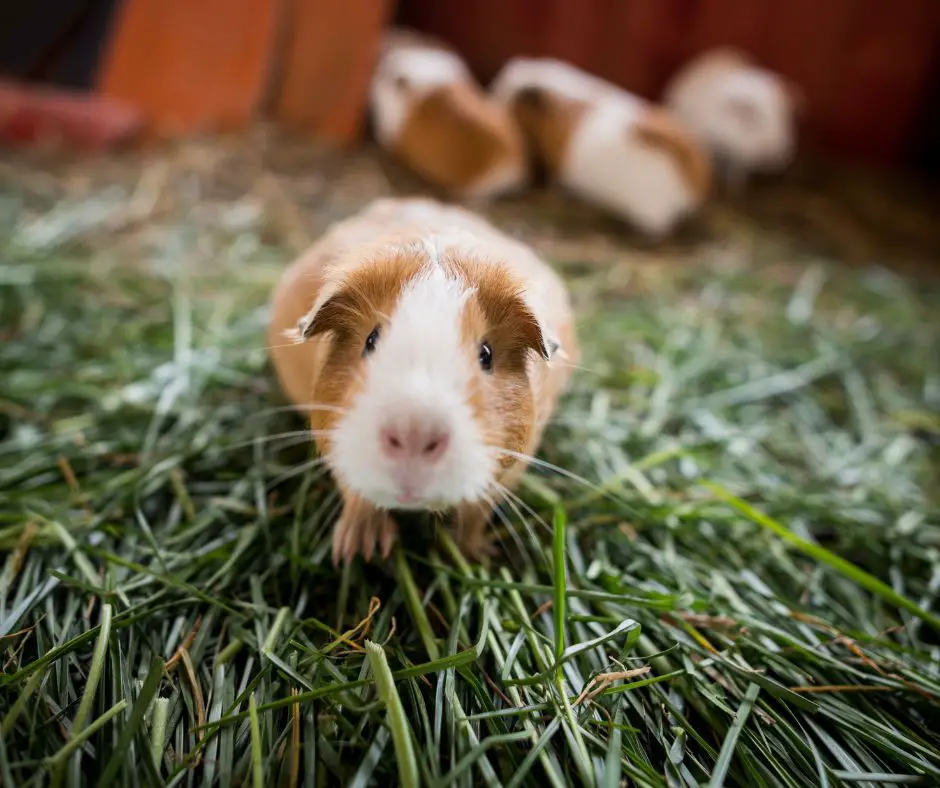
Signs of Guinea Pig Diarrhea
Apart from passing out the loose or watery stool, diarrhea in guinea pigs has many other signs. Your cavy will start losing weight, low activity due to weight loss, lose appetite, and become dehydrated.
Other guinea pigs may also show rough coats, fecal staining of fur around the anal region, hunched posture, low temperature, dull eyes, and abdominal pain.
Diarrhea can be severe and cause sudden death in guinea pigs. You, therefore, need to act with speed to save your cavies.
You should advance your hygiene practices when your guinea pigs have diarrhea. That involves frequent cage cleaning and fecal staining on the fur on your cavies.
Hold the pig in your lap and gently but repeatedly wipe the poop with a warm, wet cloth. Do not use baby wipes!
Also read: Guinea Pig Poop: 7 Different Shades and What They Mean
Diagnosis Guinea Pig Diarrhea
The most apparent diarrhea diagnosis is the examination of clinical signs. Your professional vet may complete the dietary history of the pet and examine its stool and blood samples for any possible infections.
The process will help find the root cause and recommendation of proper medication.
5 Causes of Guinea Pig Diarrhea
Diarrhea in guinea pigs is a common health issue that is nearly impossible to avoid. It is caused by various factors, including diet, micro-organisms, stress, dental problems, and many others.
As a pet owner, you should do your best to not expose your cavies to these causative agents.

Improper Diet
A diet comprising mainly grains and soluble sugars and little or no fiber is likely to cause stomach upset in guinea pigs.
That is because the crucial bacteria in the digestive system of these animals will be overwhelmed, leading to a surge in the population of harmful bacteria.
An imbalance of good bacteria in the digestive system, excess water, lack of fiber, and hypovitaminosis can lead to a watery stool. Stomach upset is often accompanied by pain in the lower abdomen.
The situation can repeat itself if you don’t make dietary changes to your guinea pigs. Consider reducing grains and soluble sugar in the diet while increasing fiber content. Fresh green fruits and vegetables are ideal sources.
Infectious Agents or Parasitic
Bacteria and viruses are the most likely cause of diarrhea in guinea pigs. They can disrupt the normal functioning of the gut in cavies. An overgrowth of bacteria in the digestive system and wound infections can lead to diarrhea.
Intestinal parasites are rare in guinea pigs, but external ones are more stressful guinea pigs. Mange and lice can be stressful to your guinea pigs, causing diarrhea. These are also characterized by rough coats, moodiness, and reduced activity.
You can avoid diarrhea in guinea pigs by keeping their cages clean, disease-free, and free from parasitic invasion. Also, treat any wounds or respiratory issues on time to avoid diarrhea.
Guinea Pig Stress
Stress in guinea pigs can result from various factors. The most apparent ones are parasites and diseases. Environmental factors, such as new cage mates, children, noise, temperature changes, and other pets, can also stress your guinea pigs.
Stress will generally disrupt normal body functions, sometimes triggering diarrhea. You can only avoid that by keeping your guinea pigs comfortable and happy.
Remove all environmental factors that the piggies don’t like. Ensure they are stress-free in the cage.
Dental Problems
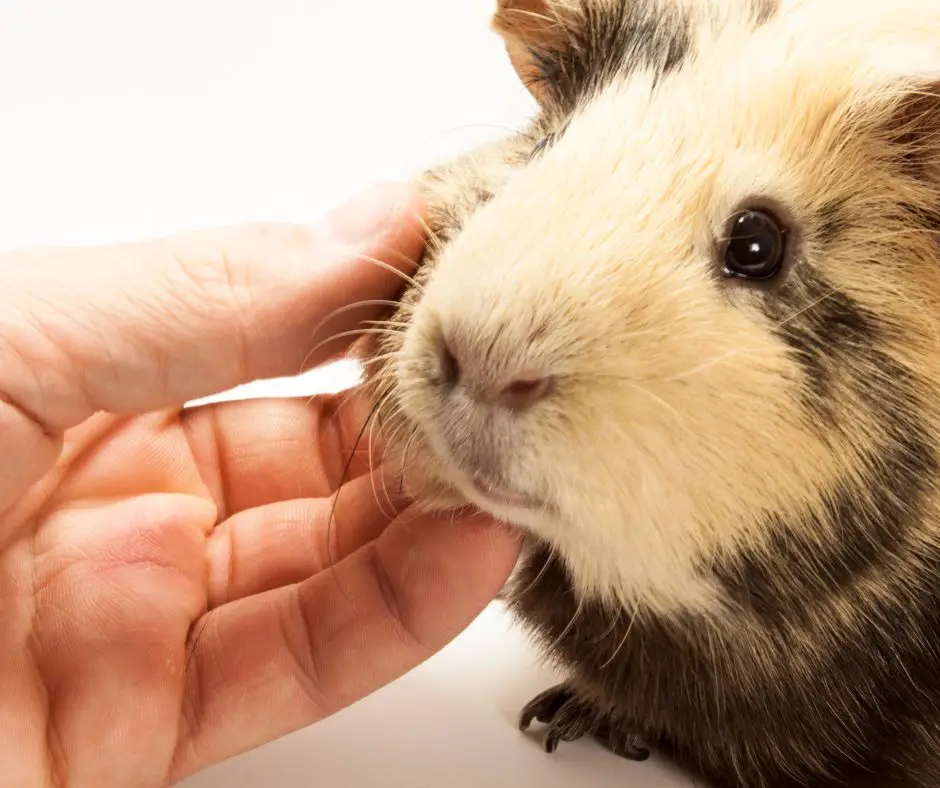
The dental issue that most guinea pigs experience is malocclusion. This is improper teeth alignment, which can be hereditary or caused by vitamin C deficiency, injuries, and mineral imbalance in the diet.
Guinea pigs’ teeth grow throughout their lifetime. If teeth are not aligned properly, some can overgrow. That makes it hard for the pet to chew.
That can lead to diarrhea. The problem is associated with weight loss, bleeding from the mouth, not eating, and abscesses.
The dental problem requires a clinical examination. Take your guinea pigs to a vet, who may need to clip or file some teeth to help your pet. The problem may become periodic. So, monthly visits to a vet for dental care should be part of you.
Metabolic Disturbances Organs Such As The Liver or Kidney
Underlying conditions in vital organs such as the liver and kidney may cause diarrhea in guinea pigs. We all know the crucial digestive roles of these organs. If anything interrupts them, the consequences may be diarrhea and other symptoms.
Damaged kidneys, for example, may lead to urinary tract problems such as inflammation and bladder stones. These are particularly common in guinea pigs put on a poor diet.
To prevent or lessen their occurrences, stick to a proper feeding program.
How To Treat Guinea Pig Diarrhea
Diarrhea in guinea pigs is best treated if you already know the cause. So, proper diagnosis is a crucial stage when treating diarrhea.
Based on your findings, you can adjust diet, remove stressing conditions, treat any underlying conditions, etc. You may also need to treat the symptoms that come with diarrhea. If you act in time, you can save your pets.
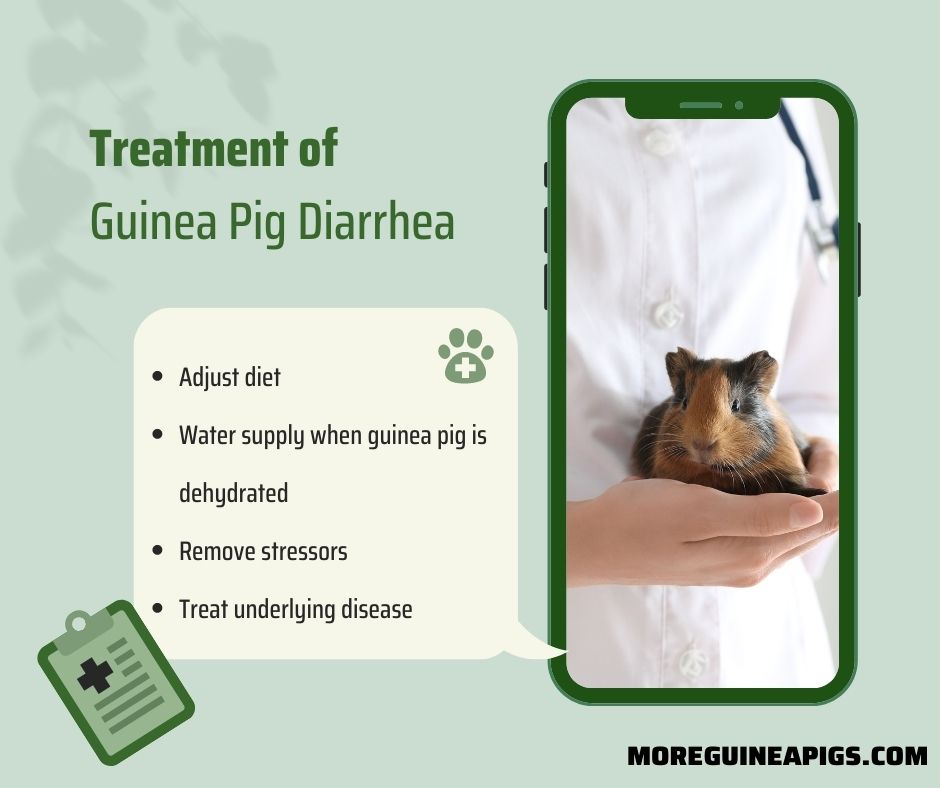
Adjust Diet
Nutritional therapy can be the first step in diarrhea treatment if it is caused by poor nutrition. As a pet owner, you should be keen on what you feed your cavies. It has to be balanced or formulated for guinea pigs.
Guinea pigs are best fed fresh green fruits and vegetables, but you should regulate the quantity. The diet should be low in calcium but high in fiber to aid digestion. Introduce quality grass or hay, which should form the bulk of the daily diet.
Reduce the number of fruits your guinea pigs eat because most have high sugar content. You can consider fruits such as apples, bananas, blueberries, watermelon, cucumber, and cantaloupe.
And for vegetables, consider carrots, peas, broccoli spears, bell peppers, Romaine lettuce, and other dark green vegetables.
A note on a recovery food such as Oxbow Critical Care that can be syringed.
Also read:
Oxbow Essentials Guinea Pig Food – All Natural Guinea Pig Pellets for Adults and Young Guinea Pigs
Administered If Your Guinea Pig Is Dehydrated
If your guinea pigs are dehydrated, rehydration is the solution to restore the fluid level in the body.
Usually, your cavies require about 100ml or half a cup of water daily. In case of dehydration, you need to give more. Do that using a syringe as a DIY approach.
Pass the fluid in piecemeal through the diastema of the sick pet. But if that does not work, consult your vet for subcutaneous, intravenous or intraosseous or other alternatives.
Remove Stressors
Stress in guinea pigs can result in diarrhea. Removing stressors is all about keeping your piggies happy and comfortable.
So, it begins with proper feeding and medication. Without diseases and parasites to worry about, your guinea pig will be happy.
Environmental stressors such as temperature fluctuations, cage mates, unfamiliar noises, predators, or poor handling should also be eliminated. Separate your guinea pigs the moment you see any sign of bullying.
For most, cage mates reduce stress and are important for mental wellbeing. However, mis-matched cage mates can cause stress; we need to ensure it is a good pairing.
Treat Underlying Disease
Underlying conditions can also cause diarrhea in guinea pigs. Sometimes they are not apparent, and you may need clinical examinations.
They may include parasites, dental problems, urinary tract issues, gastrointestinal stasis, and many others. Use the recommended medication to treat the underlying condition after diagnosis.
Also read: 8 Disorders and Diseases of Guinea Pigs
What Happens If Diarrhea Untreated?
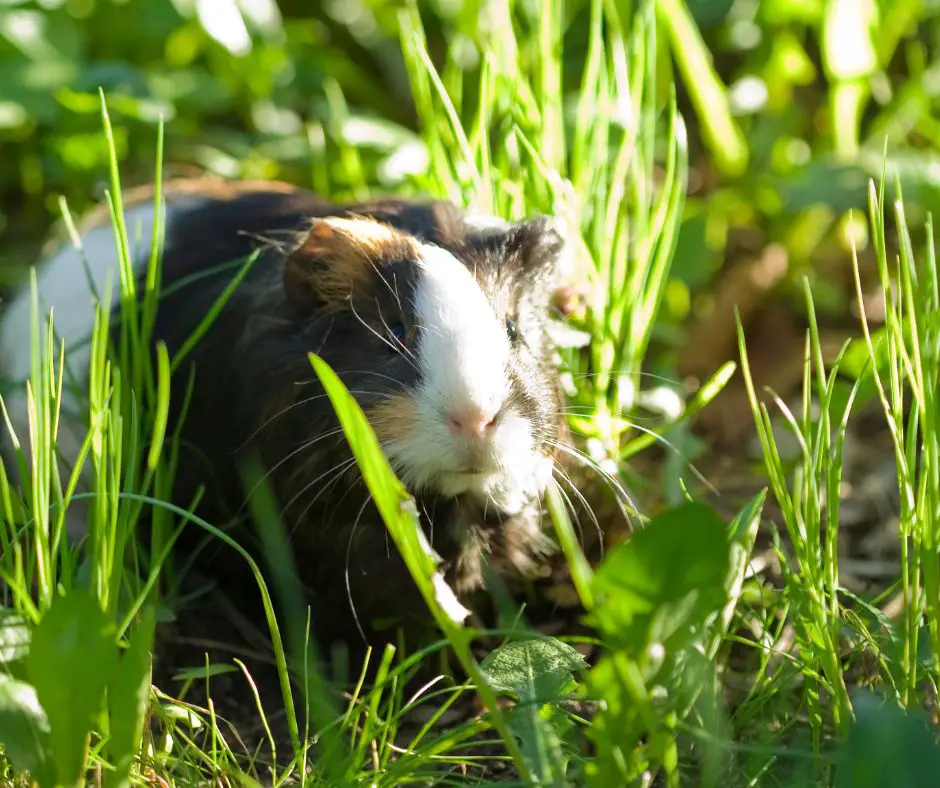
Diarrhea in guinea pigs often occurs due to some underlying conditions, which should be addressed. You don’t directly treat diarrhea because it is just a symptom, but handle the causative agent.
Most guinea pigs can survive diarrhea if treated on time. However, some may succumb to the disease. Diarrhea is potentially fatal. It can cause deaths if you don’t act with speed to diagnose the cause and administer the appropriate treatment.
Prolonged diarrhea leads to dehydration and even death in severe cases. If you cannot treat your sick guinea pig, book an appointment with a veterinarian for proper clinical examinations.
How To Prevent Diarrhea In Guinea Pig
Diarrhea in guinea can be contagious or not, depending on the cause. If one guinea pig in the cage shows the signs, separate it from the rest.
It will only be a matter of time before the healthy one starts showing signs because they share habitat and food.
The first step in preventing diarrhea is giving your cavies a balanced diet. The diet should be rich in vitamin C and fibers. Other nutrients should also just be enough and not too much.
The next step is to ensure the comfort and happiness of your guinea pigs. The environment where they live should offer all favorable conditions. Maintain hygiene and check their health status regularly.
Also read: Complete Guinea Pig Care Guide
OASIS #80254 Vita Drops-Pure C for Guinea Pig, 2-Ounce, Packaging may vary
Summary
Diarrhea in guinea pigs shows an underlying illness or condition. You should act with speed to diagnose the cause and treat it.
If left untreated, it can lead to dehydration and the possible death of your cavies. Fortunately, most guinea pigs recover from diarrhea.
Thank you for your time at Moreguineapigs. We are thankful for reading this article and kindly ask you to share it to pass the information to other pet lovers. You can also explore more topics from our previous posts.
